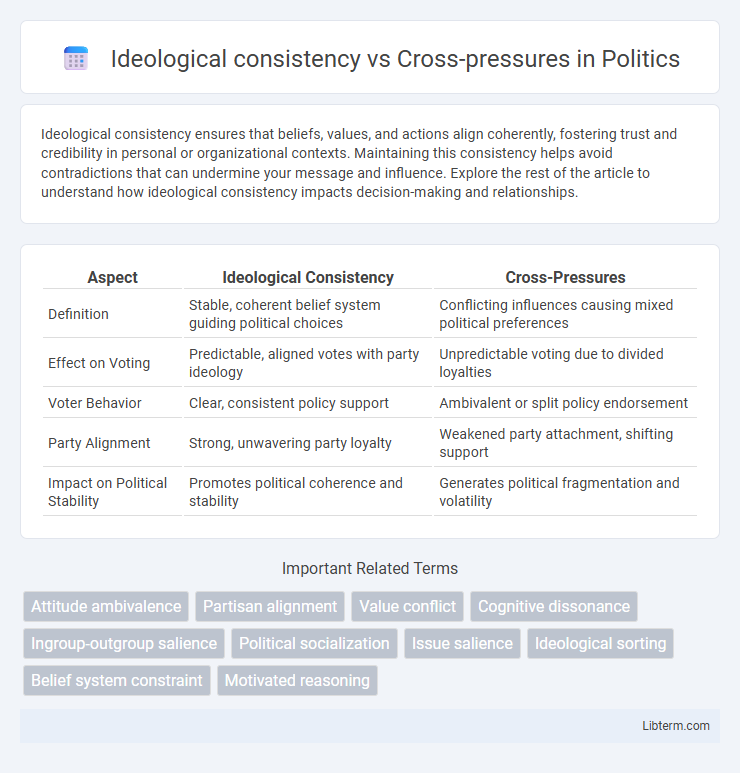Ideological consistency ensures that beliefs, values, and actions align coherently, fostering trust and credibility in personal or organizational contexts. Maintaining this consistency helps avoid contradictions that can undermine your message and influence. Explore the rest of the article to understand how ideological consistency impacts decision-making and relationships.
Table of Comparison
| Aspect | Ideological Consistency | Cross-Pressures |
|---|---|---|
| Definition | Stable, coherent belief system guiding political choices | Conflicting influences causing mixed political preferences |
| Effect on Voting | Predictable, aligned votes with party ideology | Unpredictable voting due to divided loyalties |
| Voter Behavior | Clear, consistent policy support | Ambivalent or split policy endorsement |
| Party Alignment | Strong, unwavering party loyalty | Weakened party attachment, shifting support |
| Impact on Political Stability | Promotes political coherence and stability | Generates political fragmentation and volatility |
Understanding Ideological Consistency
Understanding ideological consistency involves analyzing how individuals maintain stable beliefs across political issues without contradiction. Ideological consistency ensures a coherent worldview, enabling voters to predict policy preferences and align consistently with political parties. It contrasts with cross-pressures, where conflicting social identities or interests cause individuals to hold mixed or inconsistent political attitudes.
Defining Cross-Pressures in Political Behavior
Cross-pressures in political behavior occur when individuals face conflicting influences from different social groups or identities, leading to inconsistent political attitudes and voting patterns. This phenomenon contrasts with ideological consistency, where a person's political beliefs and actions align coherently with a single set of principles or ideology. Cross-pressures often arise from factors such as race, religion, class, or geographic location that pull voters in divergent political directions, resulting in moderate or unpredictable electoral behavior.
Psychological Roots of Ideological Alignment
Ideological consistency stems from cognitive processes that favor coherence and stability in belief systems, reducing psychological discomfort caused by conflicting attitudes. Cross-pressures arise when individuals face competing influences from social identities, group affiliations, or situational factors, creating tension between contradictory ideological cues. The psychological roots of ideological alignment involve balancing the need for cognitive consonance with external social demands, leading to varying degrees of ideological rigidity or flexibility.
The Impact of Social Identity on Cross-Pressures
Social identity significantly amplifies cross-pressures by intertwining political beliefs with group affiliations, leading individuals to experience conflicting loyalties between ideological consistency and social ties. When social identity aligns with opposing political views, voters face cognitive dissonance that challenges strict adherence to a single ideology. This dynamic often results in nuanced voting behavior, as people balance ideological preferences against the desire to maintain group cohesion and social acceptance.
Ideological Consistency in Modern Political Parties
Ideological consistency in modern political parties ensures a coherent policy platform that strengthens voter alignment and party identity, promoting stable electoral support. Strong ideological adherence facilitates clear messaging and reduces internal conflicts, enhancing party discipline and effectiveness in legislative processes. Empirical studies reveal that parties with high ideological consistency are more likely to maintain loyal voter bases and achieve long-term political success.
Cross-Pressures and Voting Behavior
Cross-pressures occur when voters face conflicting influences from different social groups or beliefs, leading to ambivalence in their political choices. This tension often results in less predictable voting behavior and can decrease electoral volatility by promoting moderation or swing votes. Understanding cross-pressures is essential for analyzing how overlapping identities and values affect party alignment and voter turnout.
The Role of Media in Shaping Ideological Consistency
Media plays a critical role in shaping ideological consistency by selectively reinforcing specific viewpoints and framing political discourse to align with particular ideologies. Through algorithms and editorial choices, media outlets create echo chambers that reduce exposure to cross-pressures, thereby strengthening ideological commitment among audiences. The persistent exposure to ideologically congruent content minimizes cognitive dissonance and promotes a unified belief system, influencing both voter behavior and political polarization.
Consequences of Cross-Pressures for Public Opinion
Cross-pressures create conflicting influences on individuals, leading to less stable and more ambivalent public opinions compared to ideological consistency. When voters face cross-pressures from differing social identities, such as class and religion, their issue positions and candidate preferences often become unpredictable, reducing polarization within the electorate. This instability complicates political mobilization and weakens the clarity of opinion trends, making it difficult for parties to rely on traditional voting blocs.
Navigating Ideological Inconsistency in Democratic Systems
Navigating ideological inconsistency in democratic systems requires balancing ideological consistency with cross-pressures that arise from diverse social, economic, and political interests. Democratic actors often face competing demands from party lines, voter preferences, and institutional constraints, leading to nuanced policy decisions that reflect compromise rather than rigid adherence to ideology. Understanding these dynamics is crucial for fostering responsive governance while maintaining legitimacy and public trust in pluralistic societies.
Resolving Cross-Pressures: Pathways to Political Cohesion
Resolving cross-pressures requires addressing conflicting values and loyalties within individuals or groups by fostering dialogue and shared goals that bridge ideological divides. Emphasizing inclusive political frameworks and adaptive policy-making strengthens ideological consistency while accommodating diverse perspectives, thereby enhancing political cohesion. Empirical studies highlight that participatory decision-making and integrative leadership reduce fragmentation, promoting sustainable unity in pluralistic societies.
Ideological consistency Infographic

 libterm.com
libterm.com